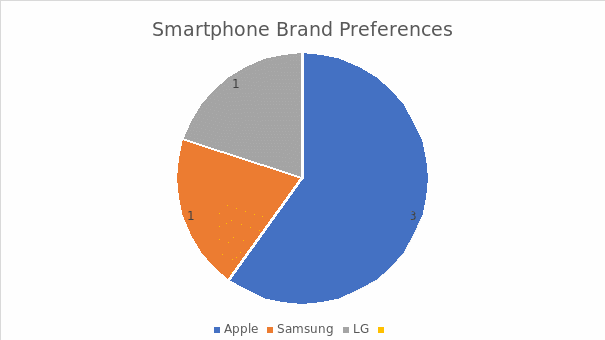
Interest and brand loyalty have a vital influence on consumer choices regarding smartphones. The satisfaction that various people attain from the innovativeness of a specific manufacturer is what makes them remain loyal to the brand (Kim et al., 2020). The study’s main aim was to determine the preferences of family members and friends among different smartphone brands. The data was collected from five individuals who represented their family members in filling the information. This paper summarizes the results obtained from the survey on various family or friends’ preferences and factors that influence these individuals in their choices. Three out of the five people indicated that their family members preferred Apple, one LG, and the other Samsung brand. In percentage, those who chose Apple as their friend’s preferred brand total up to 60%, while the other two remaining brands shared the remaining percentage equally.
The results show that more people prefer Apple products meaning that the company dominates the smartphone market. For other mobile manufacturers, this indicates that they still have a lot of improvements to make in their gadgets to be appealing to the final consumers. In 2007, Apple led a revolution in the mobile industry by unveiling a mobile phone with a touch screen that could access the internet (Kim et al., 2020). The original iPhone that started to be sold about fifteen years ago established the foundation for contemporary smartphones, and it forever changed the way people access global information. The invention introduced two crucial concepts that will remain vital elements in mobile phones for many years to come: the App Store and the touch screen (Kim et al., 2020). Smartphones existed even before the iPhone but were expensive and unwieldy. Thus, for other mobile manufacturers to get where the Apple brand is in terms of popularity and market shares, they need to develop revolutionary devices that change who people view and use mobile phones.
Consequently, consumers’ perception of the different brands is what affects their choices. The study indicates that technical issues and prices are the major factors influencing why many people prefer Apple phones compared to others. The family members or friends in the survey consider iPhones to have better battery life, proper network connectivity, and standard display. The technological needs, applications, processing speed, and ease of use are other factors that make iPhones seem preferable to other brands. In addition, Apple smartphones are viewed as more secure than their counterparts. According to Forbes magazine, android phones fall victim to 97% of smartphone malware (Kim et al., 2020). Android phones are infected by this virus and malware primarily through the app store, leading to many individuals opting for Apple devices. Moreover, many consumers perceive iPhones as more appealing since they act as handheld computers, game consoles, portable media players, and mobile phones.
The level of innovation and the device’s processing speed make it retain its clients. The analysis indicates that just like iPhone, other smartphone manufacturers should develop products that focus on consumer satisfaction. For the Apple company to stop dominating the mobile market, other brands such as Samsung and LG need to develop ways to advance their smartphones further to compete favorably with the iPhones. Whether or not iPhone users will continue being loyal to Apple as a brand is greatly dependent on their satisfaction and the level of competitiveness in the market. Thus, other brands need to be highly innovative to penetrate the United States market fully.
Reference
Kim, J., Lee, H., & Lee, J. (2020). Smartphone preferences and brand loyalty: A discrete choice model reflecting the reference point and peer effect. Journal of Retailing and Consumer Services, 52, 101907. Web.